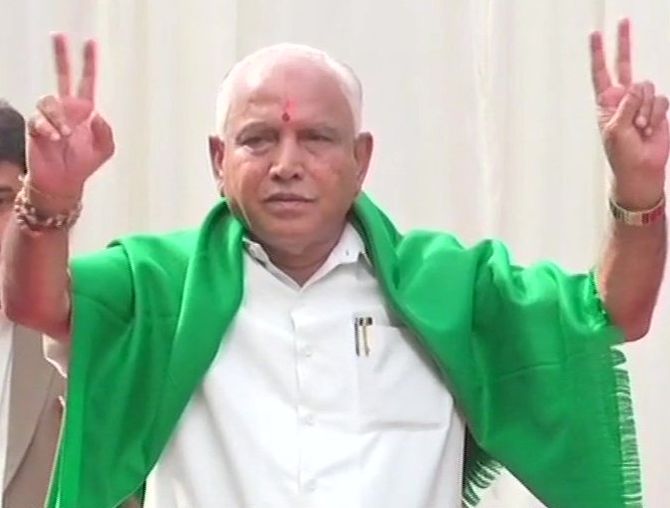Bookanakere Siddalingappa Yeddyurappa has navigated the choppy waters of politics with the consummate ease of a seasoned oarsman, defying tidal waves of adversity.

He has been controversy's favourite child.
And controversy did not leave him alone even during his ascent to the throne of Karnataka amid a murky legal battle in the country's top-most court.
From the humdrum existence as a government clerk and a hardware store owner to becoming the chief minister of Karnataka for a second time, BS Yeddyurappa has navigated the choppy waters of politics with the consummate ease of a seasoned oarsman, defying tidal waves of adversity.
A hardboiled Rashtriya Swayamsevak Sangh man, 75-year-old Bookanakere Siddalingappa Yeddyurappa, joined the Hindu right organisation when he was barely 15, and cut his political teeth in the Jana Sangh, the Bharatiya Janata Party's forerunner, in his hometown Shikaripura in Shivamogga district.
He became the Jana Sangh's Shikaripura taluka chief in the early 1970s.
Currently a Lok Sabha member from Shivamogga, he was first elected to the Legislative Assembly from Shikaripura in 1983 and went on to win it five more times.
The Lingayat strongman is known to have espoused the cause of farmers, something which was repeately referred to by Prime Minister Narendra Modi in his election speeches.
A Bachelor of Arts, Yeddurappa, who was jailed during Emergency, worked as a clerk in the social welfare department before taking up a similar job at a rice mill in his native Shikaripura. Later, he set up his own hardware shop in Shivamogga.
Yeddyurappa may have landed in the hot seat in 2004 itself when the BJP emerged as the single largest party, but the Congress and JD-S of former prime minister H D Deve Gowda cobbled together an alliance, and a government was formed under Dharam Singh.
Known for his political sagacity, Yeddyurappa joined hands with H D Kumaraswamy, Deve Gowda's son, in 2006 and brought down the Dharam Singh government after the chief minister was indicted by Lokayukta in an alleged mining scam.
Under a rotational chief ministership arrangement, Kumaraswamy became the chief minister and Yeddyurappa his deputy.
However, the coalition government collapsed as the JD-S reneged on the power sharing deal after 20 months, paving the way for elections.
In the 2008 polls, the Lingayat heavyweight led the party to victory, and the first BJP government in the south was formed under him.
Soon controversies swirled around Yeddyurappa over alleged abuse of office to favour his sons in allotment of land in Bengaluru.
The indictment by Lokayukta in an illegal mining scam was the last straw that broke the camel's back, and he was forced to resign on July 31, 2011.
On October 15 that year, he surrendered before the Lokayukta court, after it issued a warrant against him in connection with alleged land scams, and was in jail for a week, dealing a body blow to the BJP's claim of being a party with a difference.
Sulking after having been made to quit, Yeddyurappa broke his decades-long association with the saffron party and formed the Karnataka Janata Paksha.
However, ploughing a lonely furrow, he failed to make the KJP a force to reckon with in Karnataka politics but wrecked the BJP's chances of retaining power in the 2013 polls, winning six seats and polling about 10 per cent votes.
As Yeddyurppa faced an uncertain future and the BJP looked for a leader with a formidable reputation to lend its campaign the required heft ahead of the 2014 Lok Sabha polls, the two cosied up to each other.
On January 9, 2014, Yeddyurappa merged his KJP with the BJP.
In the Lok Sabha elections that followed, the BJP won 19 of the state's 28 seats, a remarkable turnaround for the party which had secured a measly 19.9 per cent votes in the assembly polls just a year ago leading to the fall of its first government.
Notwithstanding the taint of corruption, Yeddyurappa's status and clout grew in the BJP.
On October 26, 2016, he got a huge relief when a special Central Bureau of Investigation court acquitted him, his two sons and son-in-law in a Rs 40 crore illegal mining case, which had cost him the chief ministership in 2011.
In January 2016, the Karnataka high court quashed all 15 FIRs against Yeddyurappa lodged by the Lokayukta police under the Prevention of Corruption Act.
In April that year, he was appointed the state BJP chief for the fourth time.
The Lingayat leader, however, continued to be dogged by controversies, with the anti-corruption bureau launching proceedings against him in an alleged illegal land denotification case. He petitioned the high court, which
stayed the ACB proceedings against him.
The taint of alleged corruption notwithstanding, the BJP declared him its chief ministerial candidate, ignoring the taunts by the Congress.










